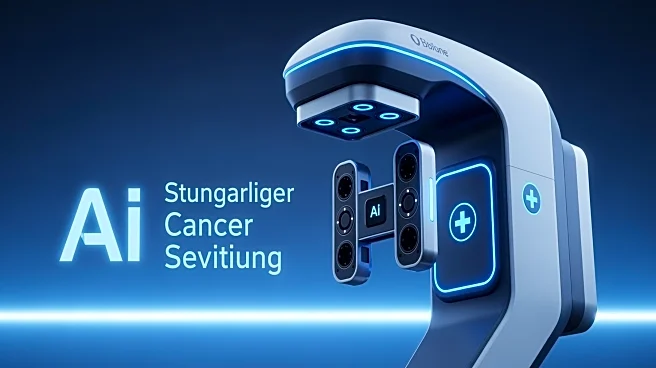What's Happening?
Advancements in artificial intelligence (AI) are poised to significantly impact lung cancer outcomes by enhancing early detection capabilities. AI technology is being integrated into healthcare systems to identify high-risk patients and detect lung cancer at its
earliest stages. This development follows the National Lung Screening Trial's findings, which demonstrated a 20% reduction in lung cancer deaths through CT screening of high-risk populations. The FDA has approved AI systems for detecting lung nodules in CT scans, marking a significant step in AI's role in lung cancer diagnosis. Currently, numerous nodule detectors are available in the U.S. and Europe, improving CT resolution and reducing radiation doses. Despite these advancements, challenges remain, such as low specificity rates and difficulties in identifying high-risk patients for screening. However, AI's continuous integration and refinement are expected to address these issues, enhancing the accuracy and efficiency of lung cancer screenings.
Why It's Important?
The integration of AI in lung cancer screening is crucial as lung cancer remains the leading cause of cancer-related deaths. Early detection is vital for improving survival rates, as late-stage diagnosis often results in poor prognoses. AI's ability to analyze vast amounts of data and identify high-risk nodules can lead to more accurate and timely diagnoses, potentially saving lives. The technology also aims to reduce unnecessary biopsies and follow-up scans, which are costly and invasive. By expanding the criteria for high-risk patients beyond smoking history, AI can help identify cases in non-smokers, who account for a significant portion of lung cancer diagnoses. This personalized approach to screening could revolutionize lung cancer detection and treatment, offering hope for better outcomes.
What's Next?
The continued development and integration of AI in lung cancer screening are expected to enhance early detection and reduce mortality rates. As AI systems become more sophisticated, they may further refine the identification of high-risk patients and improve specificity rates. The healthcare industry may see increased adoption of AI technologies, leading to more widespread and efficient screenings. Additionally, expanding the criteria for high-risk patients could lead to changes in screening guidelines, potentially increasing the number of individuals eligible for early detection. Stakeholders, including healthcare providers and policymakers, will likely focus on addressing the challenges of false positives and patient compliance to maximize the benefits of AI in lung cancer screening.
Beyond the Headlines
The ethical implications of AI in healthcare, particularly in lung cancer screening, are significant. Ensuring patient privacy and data security is paramount as AI systems handle sensitive medical information. Additionally, the reliance on AI for critical health decisions raises questions about accountability and the potential for bias in algorithms. As AI technology evolves, it will be essential to establish robust regulatory frameworks to address these concerns and ensure equitable access to advanced screening methods. The cultural shift towards embracing AI in healthcare may also influence public perception and acceptance of technology-driven medical interventions.
















